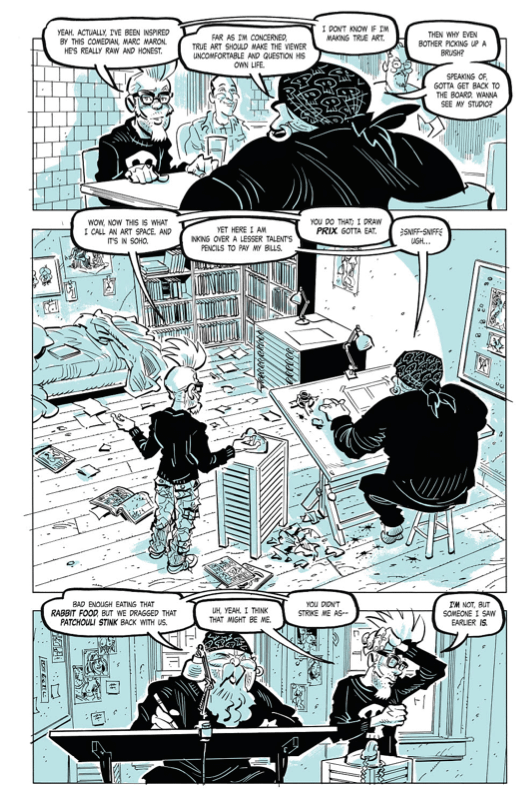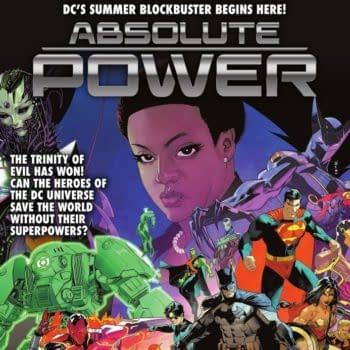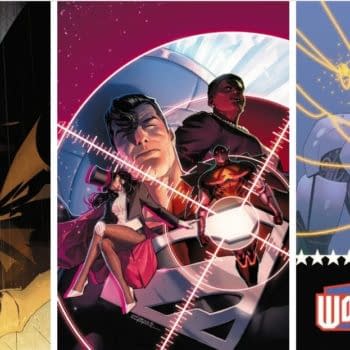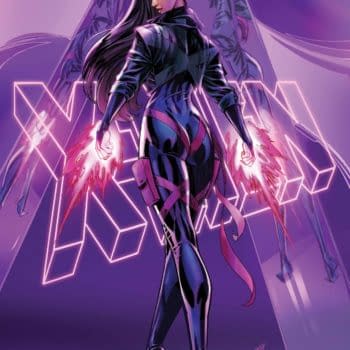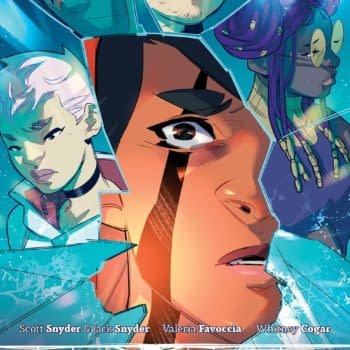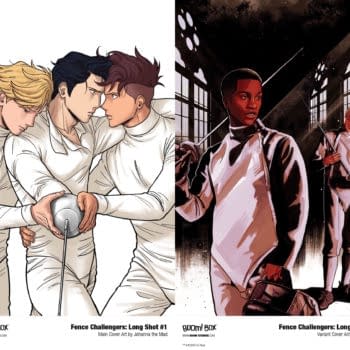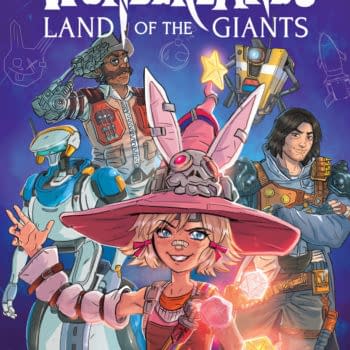Posted in: Comics, Recent Updates | Tagged: autobio comics, Bob Fingerman, Comics, image comics, indie Comics, Minimum Wage: So Many Bad Decisions
Is Minimum Wage's Fate In The Balance? Bob Fingerman In The Bleeding Cool Interview, Plus #5 Preview

Issue #5 of the idiosyncratic, highly polished and distinctively punchy comic arrives in shops today, September 2nd, continuing an arc that concludes with Issue #6. Will the series be returning? That's actually far from certain at this point, according to Fingerman. Despite the critical acclaim the comic has received in the past and present incarnations, and despite vocal bands of very loyal readers, getting big sales numbers has proved difficult in a climate where humor comics, and comics about "real life" rather than fantasy worlds or superheroes, seem to have been side-lined by readers and retailers.
At this time, Minimum Wage exists in a kind of limbo where it might continue to a 3rd arc in single issues, it might not continue at all, or as a third option, it could appear as an original graphic novel. This is the time of year when many series face an uncomfortable period of decision making, and it's particularly clear and present this year following on from the effect that orders for big summer events like Secret Wars and Convergence had on other, more indie titles. Fingerman, however, can only be rightly satisfied with what he's accomplished so far in the series, remain aware of the support of many readers, and hope for the best.

Bob Fingerman: It is something I definitely saw and continue to see as finite. Kind of like a good sitcom, or anything else, you still want it to go out while it is strong. You don't want to reach that "jump the shark" moment. I'm not afraid of that happening any time soon. I'd always felt there was unfinished business, which is why I started doing it again. I had given the original run an oblique ending, and I am fine with oblique endings, but there was more story that I wanted to tell. Coming back to it when I did, I had the first two arcs pretty well in mind. I leave some room for improvisation when I sit down to writing, but I pretty much knew where it was going. The fifth issue out of six is out today, but the sixth issue wraps up that arc in October. The first six-issue arc at Image ended on an obvious cliffhanger, but this one is more of an ending. But open enough to continue, which I hope it will be doing.
HMS: In a perfect world, if you could do this series without anything in particular affecting it, do you have an idea of where it would go?
BF: Yes. I tend to keep these kind of statements liquid, rather than dogmatic. When I was younger I tended to be dogmatic, but maybe as you get older, you become more pragmatic. The next story that I want to tell with Rob is actually a kind of a departure in some ways from what I've done to date. Working on something like this poses the question of how to keep it fresh for the readers, but just as importantly, "How do I keep it fresh for me?"
HMS: Right.
BF: I don't really like repeating myself. I get restless. Without getting into details, I have something very different in mind for what would be the third arc of the new Minimum Wage, but after that, there's a big question mark. I might just want to end it there. There's a finite amount of material that I want to explore, at least on paper, with Minimum Wage. The other thing with the series is that it's long been my desire to pursue it for television. It's always had an episodic nature, even though it has an ongoing storyline. The media landscape is much more ready and receptive to something like Minimum Wage now, and actually there is interest, which is encouraging. I'm so used to doing everything myself on the series, now more than I was younger, I'm sanguine about it becoming a group property, especially since I have this idea for a third run, and then I might be done. These characters might be able to go on, but with some fresh minds attached to them.

BF: I think there's a lot of fertile material.
HMS: So much history has been created for these characters that there's plenty to work with.
BF: I'm intrigued by the idea of adapting the material and expanding on it. Seeing what survives from the printed version and what morphs into something new. That's a challenge that I'd be really looking forward to.
One of the things I've been saying about Minimum Wage is that it struggles at the comic shop, but it's a mainstream idea, but it's mainstream in a different medium. In comics, it's this indie, alternative thing. But the execution of it is like the mainstream in TV, for instance. There are shows analogous to Minimum Wage, frank and open shows on cable, like Louie, Maron, and Girls. Also Silicon Valley. My elevator pitch for Minimum Wage is that it's a low-tech Silicon Valley. These are very adult ensemble pieces that didn't exist when I first started doing Minimum Wage at Fantagraphics but they do now.
I don't want to sound disparaging, but comic book stores can be a little out of step with the mainstream in other media in terms of what they are receptive to stocking.
HMS: You mean they can be a little out of step with the wider aspects of Pop Culture, beyond comics culture?
BF: Right. Mainstream comics have so infiltrated mainstream culture, particularly like the Marvel TV and films. And they are doing a great job. I don't even read the Marvel comics, but I like the Marvel movies. I like Agents of S.H.I.E.L.D., Agent Carter, and I thought Daredevil on Netflix was great. They are taking traditional comics stuff into the mainstream, but it's not a two way street because the things that are becoming big in mainstream culture don't make it back into the comics stuff.
HMS: Well, occasionally the all-ages animation stuff does, but the more sophisticated stuff doesn't as much. You're right. You get licensed properties which sometimes really add to the narrative, like IDW's Orphan Black. It's weird though, because it's really true that we have less and less of a place for comedy in comics, even though we have it on the screen. That's what people are watching on Hulu. People binge-watching shows are choosing comedy as much as anything else.

HMS: Or if it is right now, it has to be in the guise of a genre-mix. Like, "Oh, Hawkeye is funny! How amazing". Bringing humor into superhero stories. Like the recent release, Hank Johnson: Agent of…Hydra. That's funny, sure it is. But within the context of a superhero universe.
I could be totally off-base, but it occurs to me that comics are so self-conscious right now that they are afraid to be funny in case they will lose ground on being taken seriously as a medium in the wider mainstream. As comics is being thrown onto the wider pop culture stage through these superhero films and TV show, they are like a teenager saying, "You gotta take me seriously, man!" And they are going for hard drama, journalism, action-adventure comics. I'd say memoir has been sidelined but is ready for a comeback. It's almost like they don't want to own up to the humor aspects right now because it's not part of the agenda of being taken seriously.
BF: There is something vaguely out of step about wanting to be funny. Minimum Wage is a kind of funny. It's a situation comedy. I'm not setting out to write jokes, though.
HMS: It's life comedy in the sense of observing life.
BF: Right. I just picked up the final installment of Evan Dorkin's Eltingville saga. Evan gives you your money's worth, with so much to read and look at. It was so refreshing. I saw that on the rack, and thought, "Oh, something funny!" and snatched it up immediately.
HMS: There's an incredible density there—like a whole book per issue. I get the sense that his comics can be grueling to produce. Minimum Wage gives me the same impression. Is that true?
BF: I don't know about grueling. Maybe "painstaking". I don't know how manifest it is to other people, but I can see growth and change in the art, even since the first issue of the Image run. It's become more confident and sophisticated, and there's a pleasure in that. I always try to take pleasure in what I do, even if getting there some days is more difficult than others. When you do something tangible like a comic page, at the end of the day you can say to yourself that you did good work or you didn't do good work, since it's there.
HMS: I'll be totally honest here. I was recently looking at the Marc Maron issue, and I just couldn't believe how polished each page unit looked, as if there was just not a single curve or line out of place, and carefully dense. I assume that takes a fair amount of time to do that, but maybe your instincts have just developed so far from working with this property that it doesn't.
BF: I don't want to sound immodest, but it isn't the struggle it used to be. I generally do a page a day, which is pretty good, productivity-wise. In some ways the work has gotten looser and in other ways more slick. The one good thing about producing on a regular basis is that it works that muscle.

BF: Yes, exactly. That's why I see change and growth in the Image series. I like the way it all looks, but I was a little rusty to start with, and I think that has abated. The Maron issue was really fun to do. I had a blast doing the "dream chapter" because that was so completely different than anything else.
HMS: Yes!
BF: I have no idea what people thought of that! That chapter got zero feedback. Maybe it just stunned people or left them cold.
HMS: Well, let me tell you that when I told Rich Johnston I was going to talk to you, the first thing he said was, "Ask him about the dream sequence". So there you go! He was very impressed and going on and on about it.
Is it that never in that comic, or never in any of your comics you've done something like that?
BF: Well, I've had some dream sequences in Minimum Wage, but they've always been very short. Before this, it was just Rob being tormented by those horseshoe crab characters he's doing for a living. This time it was more fun to open it up and get inside his brain, setting up the final two chapters of this run. It wasn't pure self-indulgence! I did have a bigger purpose in mind.
HMS: But it's also a dream sequence inside the mind of a cartoonist, and that's what's particularly appealing to comics fans.
You must realize that, right? Rich and I were having a discussion about Minimum Wage, and we brought up how so much discussion right now on news sites and blogs is about the realities of being a cartoonist, and how it's not glamorous, and the problems thereof. The inequalities, and the injustices, and all of these things.
And yet when someone actually produces a comic that runs for some time, that's very realistic, and about the life of a cartoonist, it doesn't get the attention that we feel it deserves. Why is that? We're willing to talk in journalism about the life of a cartoonist, but when people pick up a comic to read, they'd rather not?
BF: Yeah, I'm not sure. Maybe it's just that some people don't want to see behind the curtain. They don't want to see how the sausage is made. I'm very conscious of that. Even though there is a lot about Rob and his career, I tend not to spend too much time with him at the board. Like in biopics of writers, you spend a minimum amount of time showing the guy at the typewriter. Like using the dream sequence as a way of covering a couple of bases at once. He doesn't enjoy doing this franchise book he's doing. He feels he's squandering his talent. Maybe Rob's an ego-maniac and this is exactly the job he should be doing.
I have friends tell me that Rob annoys them because he doesn't ever acknowledge how good he's got it. That's part of what I'm trying to do here. This is a story about a younger man who can't see the forest for the trees. He's got a good career, and friends. He might not be finding a relationship that works, but he's actually dating and has a sex life. He's a guy who cannot see that things aren't terrible. He lacks perspective. Using a dream makes sense. He has characters he resents drawing counseling him in his dreams. Though he hates them, they are savvy, as parts of his subconscious. They are telling him he's making bad choices, and so they have a lot to do with his "real" life and not his professional life. That's some of my intent.
HMS: That's a cool solution to bring in a lot of things about his personality at once without overburdening the narrative.
BF: Even so, I do occasionally have him bent over a drafting table, but I still hope it's entertaining. That's my one goal—I always hope it's entertaining.
The biggest crime, always, is to be boring.
HMS: Not to take away from the art at all, but it's a very writerly comic. The writing is important, there's a fair amount of text per page, and that's something that suggests it could transition to another medium well.
BF: Well, I'm glad that you've acknowledged the art. I think because it is dialogue and character driven, a lot of people haven't noticed the art. Which in some ways is ok, since it's not being showy. If you see a movie and the soundtrack is intrusive, it doesn't serve the story, and in a comic, it's not the same as the music, but the story should be what drives it.
A small dream of mine would be to do a Kickstarter "silent edition" of Minimum Wage which is just the art.
HMS: Oh! That would be awesome.
BF: Since I cover up so much of the art with the lettering, it would give people the chance to appreciate the art. People might be surprised!
But that said, I've also become more disciplined in the writing where I try to keep the writing from feeling oppressive. If you look at the original run of the comic, it's very dense. But it's pared back now and I think that makes for a better read.
HMS: Well, regarding your art, no one draws like you. Now that there are more and more art school and university programs for cartooning and making comics, students can develop these proficiencies in technique that are very impressive. But those degrees can't teach you individuality. That's something you have to reach through your own very hard work. Among Image books that are out, some are similar or trendy in art styles, but it seems to me that when people are looking for an Image book, they are still looking for an individualistic work that's recognizably itself.
BF: There's a lot out there. Minimum Wage at Image is kind of unique. I don't think there are any other real-life, semi-autobiographical titles being done by them. Which in some ways makes it much harder for them to market. It is a bit of an odd fit.
HMS: Regarding the sequential nature of the comic, does it read any different to you when it's collected? Would you consider doing the third arc of Minimum Wage as an original graphic novel?
BF: Especially for something like this, I think we live in an age where "wait for trade" has become part of the vernacular, and sometimes it may be better to skip the foreplay and go straight to the trade. This is an era of Netflix and Hulu. It's the age of binge-watching. And serialized stories, aside from the die-hards, don't have the appeal they once did. I never read mainstream comics, but I was a huge fan of Heavy Metal magazine. For Heavy Metal's first decade, everything was serialized. I liked it even though it was frustrating. It gave me something to really look forward to. But I don't think people think that way any more. It's a very "I want it now" era. I'd rather just give it to them all in one go and say, "Here, have at it".
HMS: So, to be blunt, there are three options that might happen to Minimum Wage now. The third arc might not happen at all. Or it might happen as a serialized comic. Or it might happen as a single graphic novel.
BF: Those are the three options. Needless to say, I prefer the latter two.
HMS: If it was going to be an OGN, would there be substantial delays in it coming out?
BF: Not really, actually. Because I usually put four issues in the can ahead of a series starting. As we're speaking, I have the final touches of the matter [letter column, etc.] on my computer screen for #6, but it's all done. It would probably take me not much longer than it would to start another series.
HMS: It sounds like almost the same release schedule.
BF: I might reduce it slightly from like 120 pages to 100, which helps.
HMS: Now, you were involved in the design work on all the trades, right? Including the large collection?
BF: Yes.
HMS: It would be no leap at all to design a third one for an OGN.
BF: Nope. I work with a great guy, Drew Gill, at Image, who has been enormously helpful.
HMS: Anything else you'd like to add about Minimum Wage?
BF: Well, I don't want to end on a down note, and though the industry has become really volatile, I still remain strangely optimistic. I think I used to be more given to pessimism than I am now. My feeling is that there are many opportunities for things I want to do. If I am not able to continue with this, which I would certainly like to do, it won't be the last that anyone hears of me creatively.
HMS: Any you're multi-talented as well in prose and comics. It sounds like working on this book has put you in a position where you are well equipped to do creator-owned work.
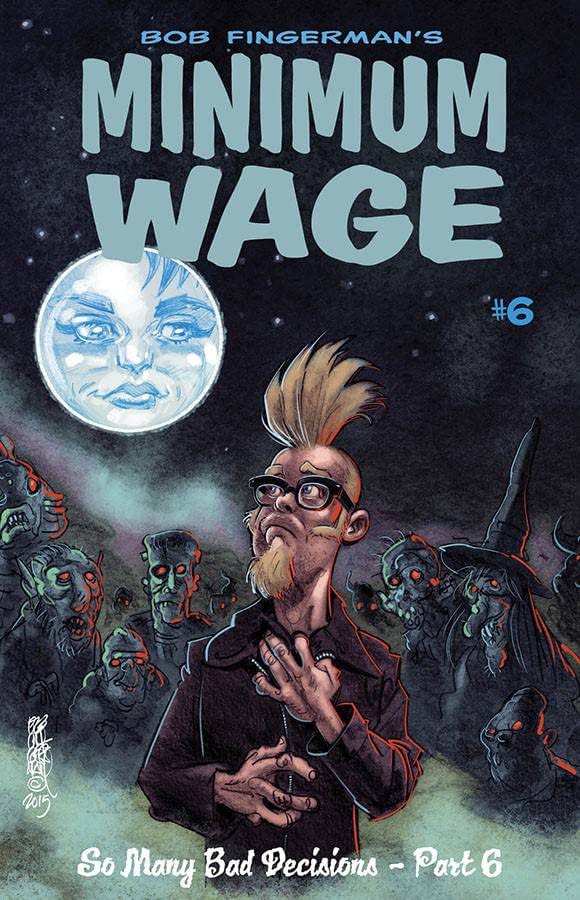
Are you hoping to influence the fate of Minimum Wage and show your support? Tweet at Bob Fingerman, @fingerbo and @image with your thoughts. And, of course, buy the comic, and tell others to do so!



